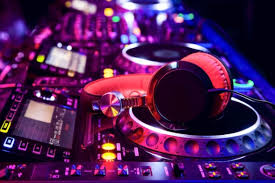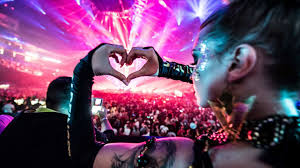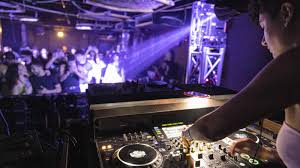EDM Genres Explained: A Guide to Electronic Dance Music Styles
Posted by Cosplay Moon on
Deciphering EDM Genres: A Comprehensive Guide to Electronic Dance Music Styles
Table of Contents
- Introduction
- The Evolution of Electronic Dance Music (EDM)
- A Guide to Popular EDM Genres
- House Music
- Trance
- Dubstep
- Drum and Bass
- Techno
- The Pioneers and Modern Icons
- House Music: From Chicago to the World
- Trance Titans: From Goa to the Mainstage
- Dubstep's Wobble: From Croydon to Global Domination
- Drum and Bass: The UK Underground Phenomenon
- Techno Legends: Berlin's Sonic Revolution
- Frequently Asked Questions
- Conclusion
- Call to Action
- Sources
Introduction
Electronic Dance Music (EDM) is a sprawling, vibrant universe of sound, encompassing a myriad of genres, sub-genres, and styles. It has evolved from underground raves into a global phenomenon, influencing popular music and culture worldwide. In this guide, we will embark on an auditory journey to explore the diverse landscape of EDM genres.
From the four-on-the-floor beats of house music to the frenetic energy of drum and bass, we'll decipher the unique characteristics of each genre and introduce you to some of the iconic artists who have shaped the EDM scene. So, get ready to dive deep into the beats, melodies, and rhythms that make EDM a captivating force in the world of music.
The Evolution of Electronic Dance Music (EDM)
Before we delve into the specific EDM genres, let's take a brief look at the evolution of this electronic musical landscape. EDM emerged from the underground dance scenes of the 1970s and 1980s, with pioneers like Frankie Knuckles, Larry Levan, and Juan Atkins shaping its early sound. As technology advanced, so did the music, giving rise to the diverse array of genres we know today. Let's embark on our genre journey, exploring the unique elements that define each one.
A Guide to Popular EDM Genres
House Music
Trance
Dubstep
Drum and Bass
Techno
House Music: From Chicago to the World
House music is often considered the cornerstone of the EDM world. It's characterized by its steady four-on-the-floor beat, soulful vocals, and infectious melodies. Originating in Chicago during the 1980s, house music quickly spread to dance floors around the globe. Artists like Frankie Knuckles, Larry Heard, and Marshall Jefferson were instrumental in shaping the genre's early sound. Today, electronic music heavyweights like Daft Punk, David Guetta, and Calvin Harris continue to keep the spirit of house alive.
Trance Titans: From Goa to the Mainstage
Trance music is known for its euphoric, uplifting melodies and hypnotic beats. It emerged from the beaches of Goa, India, in the late 1980s, inspired by the hippie counterculture. Artists like Paul van Dyk, Armin van Buuren, and Tiesto have become synonymous with trance's emotional and uplifting sound. The genre's mainstage presence at festivals is a testament to its enduring popularity.
Dubstep's Wobble: From Croydon to Global Domination
Dubstep is characterized by its heavy, wobbling basslines and halftime beats. Emerging from the underground scene in Croydon, London, dubstep gained international recognition thanks to artists like Skrillex, Rusko, and Benga. Its fusion of electronic and reggae elements created a unique sonic experience that continues to resonate with fans worldwide.
Drum and Bass: The UK Underground Phenomenon
Drum and bass (DnB) is a high-energy, fast-paced genre defined by intricate breakbeats and rolling basslines. Born in the UK during the early 1990s, DnB quickly became a staple in the underground scene. Artists like Goldie, LTJ Bukem, and Andy C are known for their contributions to the genre. DnB remains an essential component of the global rave culture.
Techno Legends: Berlin's Sonic Revolution
Techno music is characterized by its repetitive beats, synthetic sounds, and a minimalist approach. It originated in Detroit in the late 1980s and later found a home in Berlin. Pioneers like Juan Atkins, Derrick May, and Richie Hawtin shaped the genre's early sound. Today, Berlin's underground clubs and festivals are synonymous with the techno experience.
Frequently Asked Questions
What is the difference between EDM and electronic music?
EDM is a specific genre within the broader category of electronic music. While electronic music encompasses all music created using electronic devices, EDM refers to the more danceable, beat-driven subset of electronic music.
Who are some modern artists pushing the boundaries of EDM?
Modern EDM artists like Flume, Zedd, and Martin Garrix continue to innovate within the genre, infusing new sounds and production techniques.
Are there other important EDM genres not covered here?
Certainly, the EDM genre landscape is vast. We've covered some of the most influential genres, but there are many more, including hardcore, techno sub-genres, and more.
Conclusion
EDM is a dynamic, ever-evolving realm of music, and its diverse genres cater to an array of tastes and preferences. Whether you find solace in the melodies of trance, the intensity of dubstep, or the hypnotic beats of techno, the EDM world offers something for everyone. As you explore these genres, you'll discover the boundless creativity and innovation that drive the electronic dance music scene.
Call to Action
Ready to immerse yourself in the world of EDM? Start by listening to tracks from the genres we've explored, and discover the artists who resonate with you. You might just find your new musical obsession.
Sources




